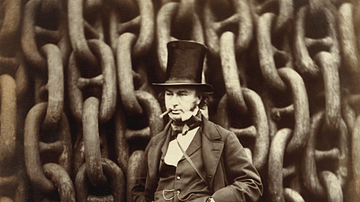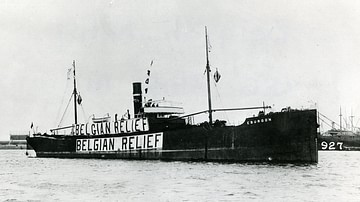Search
Summary 
Loading AI-generated summary based on World History Encyclopedia articles ...
Search Results

Article
The Railways in the British Industrial Revolution
The railways were perhaps the most visible element of the Industrial Revolution for many. Trains powered by steam engines carried goods and people faster than ever before and reached new destinations, connecting businesses to new markets...

Definition
British Industrial Revolution
The British Industrial Revolution (1760-1840) brought innovative mechanisation and deep social change. The process saw the invention of steam-powered machines, which were used in factories in ever-growing urban centres. Agriculture remained...

Article
The Impact of the British Industrial Revolution
The consequences of the British Industrial Revolution (1760-1840) were many, varied, and long-lasting. Working life in rural and urban settings was changed forever by the inventions of new machines, the spread of factories, and the decline...

Definition
Watt Steam Engine
The steam engine developed by the Scotsman James Watt (1736-1819) from 1769 was much more efficient in terms of power and fuel consumption than earlier models, and it significantly increased the possible uses for this key invention of the...

Article
Top 10 Inventions of the Industrial Revolution
The British Industrial Revolution transformed life at work and at home for practically everyone. Noise, pollution, social upheaval, and repetitive jobs were the price to pay for labour-saving machines, cheap and comfortable transportation...

Article
The Steam Engine in the British Industrial Revolution
Steam power was one of the most significant developments of the Industrial Revolution (1760-1840) in Britain. First invented as a pump in the 1690s, a host of inventors tweaked designs and tinkered with machinery until an efficient and powerful...

Definition
Isambard Kingdom Brunel
Isambard Kingdom Brunel (1806-1859) was a British engineer and a key figure of the British Industrial Revolution (1760-1840). Brunel masterminded the Great Western Railway from London to Bristol, designed and built innovative giant steamships...

Article
Coal Mining in the British Industrial Revolution
Coal mining boomed during the British Industrial Revolution as it provided fuel for steam engines of all kinds in factories, transport, and agriculture. Draining flooded mines to extract more coal was the reason the steam engine was invented...

Definition
Electrical Telegraph
The electrical telegraph was invented in 1837 by William Fothergill Cook (1806-1879) and Charles Wheatstone (1802-1875) in England with parallel innovations being made by Samuel Morse (1791-1872) in the United States. The telegraph, once...

Definition
Commission for Relief in Belgium
The Commission for Relief in Belgium (CRB) was an independent, international organization, sponsored by neutral governments and with the guarantees and assurances of the belligerents to alleviate the suffering of German-occupied Belgium in...